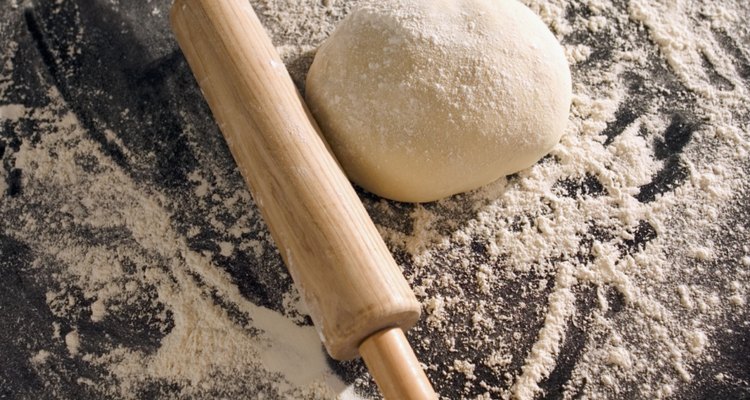
Flour has a pretty long shelf life, but it does eventually expire. If you discover that your flour smells musty, it's time to throw it away. Anything made with spoiled, musty flour will acquire its unpleasant scent and taste, ruining your yummy baked goods. Using expired flour to cook with may even make you sick because it likely contains harmful microorganisms.
All Flours Can Turn Funky
While some pantry staples like salt and baking soda last indefinitely, flour isn't one of them. All flours are made from grains, seeds or vegetables, including wheat, corn, rice, soy, amaranth, millet, legumes and potatoes. Like the ingredients the flour is made from, the flour itself can go rancid eventually because all of them contain fats in small amounts. These fats can turn rancid over time, which leads to the spoilage of the flour. Whole grain flours contain more fat than other types of flour, which is why they spoil the most quickly. rancid flour may not only smell musty, but also oily, and will usually become discolored.
It Doesn't Just Smell Bad, It Is Bad
Most manufacturers list an expiration date on the flour that they produce. While you can use this as a general guide, you can also rely on your senses when it comes to determining whether your flour is still usable. Spoiled flour develops an unpleasant, off odor and bitter flavor. Flour stored in warm, damp conditions will expire more quickly than flour stored in a cool, dark pantry. The moisture encourages the growth of mold, which is what usually causes the flour to have that musty odor. Only use flour if it has no odor at all, or a sweet, pleasant one, meaning that it's fresh.
What's the Worst That Can Happen?
The best case scenario that can occur when using musty-smelling flour to create anything from gravies to baked goods is that your finished products will taste strange or have an unusual texture. If pantry pests, like grain beetles, have spoiled and contaminated your flour, they may end up in your finished goods. While these pests may not make you sick, they'll definitely disgust anyone who eats the items you made with flour infested with them. The worst case scenario is that goods made with musty flour could make someone sick because they might contain mycotoxins like Aspergillus species, Penicillium species and even some strains of Salmonella.
Getting a Fresh Start
Flour can last up to six months past its expiration date if stored properly. To maintain the freshness of your flour, keep it as dry as possible in an air-tight container. When you purchase your flour, immediately put the unopened bag inside of a resealable plastic bag or plastic container to keep air and moisture out. If you live in a hot, humid locale, you can refrigerate or freeze your flour in its air-tight container to extend its shelf life.
Related Articles

If Flour Has Never Been Opened Can It ...

Does Flour Get Old or Go Bad?
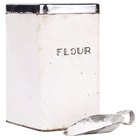
Does Flour Expire?

Does it Help to Keep Flour in the ...
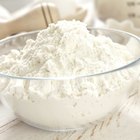
How to Store Flour

Does Flour Spoil?

How to Store Flours & Grains Without ...
How to Keep Flour for Long-Term Storage

Bugs That Get Into Pantry & Food
How to Tell If Flour Is Rancid

How Do You Keep Bugs Out of Baking ...
How Long Can Flour Be Stored in Mylar ...

Substitute for Gram or Besan Flour

About Weevils

How to Roast Chickpea Flour
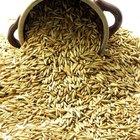
How to Store Oat Bran
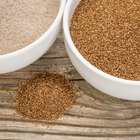
Is Teff Flour Gluten-Free?

What Is Stone-Ground Wheat?

How to Make Pistachio Flour

How to Freeze Tortilla Shells
References
- EatByDate: How Long Does Flour Last?
- FoxNews.com: When Do Food Items Really Go Bad?
- Microbial Ecology of Foods V2: Food Commodities; International Commission on Microbiological Specifications for Foods
- Grain Grading Primer; U.S. Department of Agriculture
- Utah State University Cooperative Extension: How Old is Too Old?
- Whole Grains Council: Storing Whole Grains
- Pennsylvania State University College of Agricultural Sciences: Cereal and Pantry Pests
Resources
Writer Bio
Based in Las Vegas, Susan Paretts has been writing since 1998. She writes about many subjects including pets, finances, crafts, food, home improvement, shopping and going green. Her articles, short stories and reviews have appeared on City National Bank's website and on The Noseprint. Paretts holds a Master of Professional Writing from the University of Southern California.
Photo Credits
Thinkstock Images/Stockbyte/Getty Images